Cat vaccination refers to the process of administering a vaccine to stimulate the cat’s immune system to provide protection against specific diseases. Vaccines contain dead or weakened pathogens or their components that trigger an immune response in the cat without causing the actual full-blown disease. The animal’s immune system learns to recognize and fight those pathogens through vaccinations, effectively providing the cat with immunity.
Going to the vet for her vaccinations is stressful for your cat, but you can train her beforehand to make the process less frightening. Start by acclimating your cat to her carrier, getting her familiar with car rides, and keeping calm. You might also want to try using a pheromone calming product to help relieve stress during the journey to the vet visit so that your cat arrives feeling relaxed and chilled out.
This article explains how cat vaccines work, how to prepare your cat for her vet visit, what vaccines your cat needs to protect her from common cat diseases, and how to prevent them. We also look at how to make your cat feel better after her vaccines and answer some of your most commonly asked questions.
Read this guide to learn everything you need to know about cat vaccinations, health check-ups, and how to keep your cat safe and healthy throughout her life.
What Is Cat Vaccination?
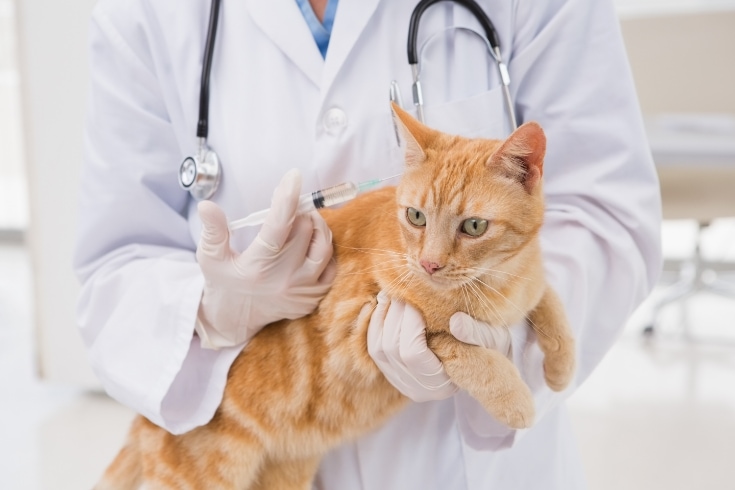
Cat vaccination is a preventative healthcare measure that involves a vet administering a vaccine to your cat to protect her from various serious infectious diseases.
The vaccine contains a weakened or inactive version of a specific pathogen (bacteria, virus, or other microorganism) that causes the disease. When the cat is vaccinated, her immune system is stimulated to produce an immune response in the form of antibodies without triggering the disease.
How Does Cat Vaccine Work?
Vaccines contain antigens, molecules from the pathogen that can trigger the cat’s immune system response. The antigens can be sugars, proteins, or other components specific to the disease-causing organism.
When the cat receives the vaccine, usually by injection, an immune response is triggered, which includes the production of antibodies specific to the antigens in the vaccine. In addition, the immune system creates “memory cells” that “remember” the specific pathogen.
That enables the cat’s immune system to respond rapidly to provide a strong defense if the cat is exposed to the actual disease in the future. The memory cells recognize the pathogen, and the antibodies produced during vaccination work to neutralize the invaders before a full-blown infection occurs.
That immune response should protect the cat from the disease. However, even if the vaccinated cat does contract the disease, its immune system will reduce the severity of the illness, which in many cases prevents the condition from being fatal or significantly debilitating.
What Vaccines Do Cats Need?
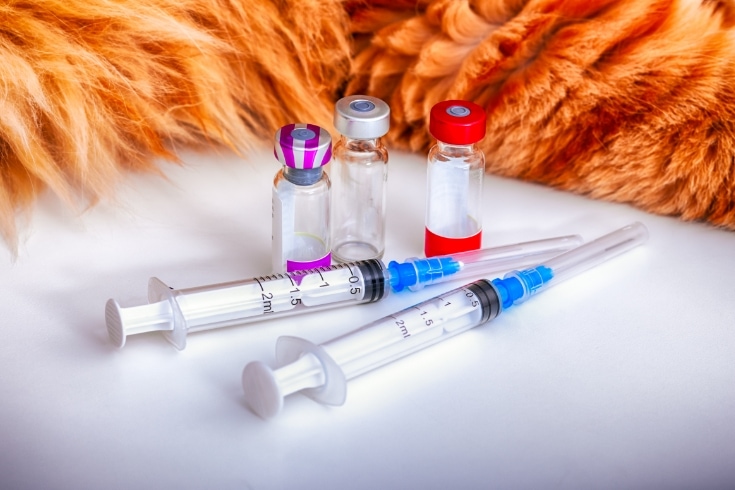
Vaccines that cats need include the following that protect your cat from dangerous diseases, some of which can be fatal. Some of these diseases can be caught through contact with infected cats and other animals, picked up from animal droppings, snails, and slugs, and even brought into your home on your shoes. So, you can see how important a regular vaccination program is for your feline friend.
FVRCP Vaccine
FVRCP stands for Feline Viral Rhinotracheitis, Calcivirus, and Panleukopenia. This combination vaccine protects your cat against these three common and highly contagious cat diseases, forming a critical part of your pet’s core vaccination program.
Rabies
Rabies is a deadly viral disease that can be transmitted to other animals and humans. Rabies vaccine for cats is a core vaccine that’s recommended in certain states due to public health implications, and all cats entering the US should receive this jab.
Feline Calicivirus (FCV)
Feline Calicivirus is a highly contagious respiratory disease that causes respiratory symptoms, joint pain, and oral ulcers. Due to the highly contagious nature of this disease, vaccination for cats in multi-pet households is especially important.
Feline Panleukopenia (FP)
Feline panleukopenia is also known as feline distemper and is a serious, often fatal viral disease in cats. The condition primarily attacks the animal’s gastrointestinal tract and immune system, and vaccination for FP is a core component of your pet’s vaccination schedule.
Feline Viral Rhinotracheitis
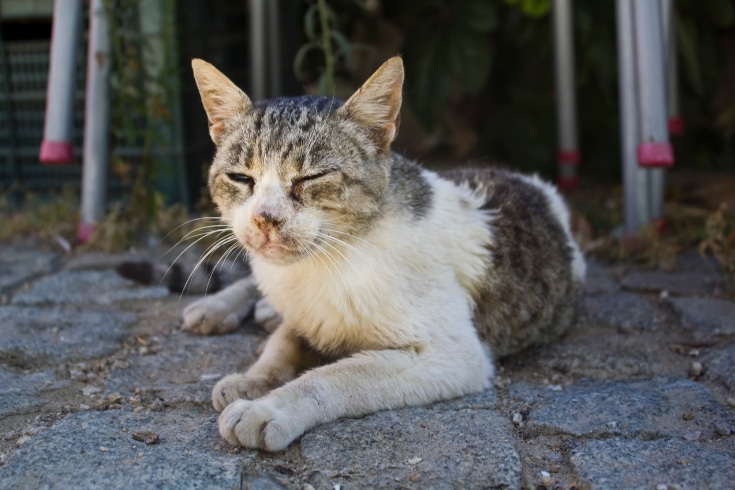
Feline rhinotracheitis is a serious, highly contagious respiratory infection caused by the feline herpes virus, and the feline rhinotracheitis vaccine is a component of the FVRCP shot.
Feline Leukemia Virus (FeLV)
FeLV is an incurable viral infection that weakens the cat’s immune system, leaving it vulnerable to other diseases and infections. Leukemia vaccines for cats are especially important for outdoor cats and those living in a multi-cat home with FeLV-positive cats.
Chlamydophila Felis
Chlamydophila felis is a bacterium that causes respiratory infections in cats. Although this vaccine is not part of the core vaccination protocol, it can be recommended by your vet in specific situations.
Bordetella Bronchiseptica
The Bordetella bronchiseptica Bacterium causes “kennel cough” in cats and is most common in environments where cats live in close quarters, such as catteries and shelters. Although this vaccination doesn’t form part of the vaccination protocols, we recommend it if you are putting your cat in a cattery while on vacation.
Feline Infectious Peritonitis (FIP)
FIP Is a complex and often fatal viral disease in cats. Unfortunately, the current vaccination that’s available for this condition is not consistently effective, so disease prevention and environmental management are essential to keep your cat safe.
What Is The Recommended Cat Vaccine Schedule?
Applying the correct cat vaccination schedule ensures that your pet receives consistent protection from a wide range of dangerous diseases. Following her initial vaccinations, your cat will need annual booster shots to keep her fully protected.
Here’s our recommended cat vaccination schedule to keep on hand so your beloved pet never misses one of her shots.
| Age | Recommended Vaccine | Cat Vaccinations Cost |
|---|---|---|
| 6-7 weeks | – FVRCP Combination Vaccine Initial vaccination 1 | $20 to $40 (and for each booster shot during the first year) |
| 8 weeks | – Fecal test- Flea & tick control | $20 to $50$50 (every 1 to 3 months, depending on product used) |
| 10 weeks | – FVRCP Combination Vaccine Booster 2 | $20 to $40 |
| 12 weeks | – Rabies Vaccine | $20 to $30 (for one year) |
| 13 weeks | – FVRCP Combination Vaccine Booster 3- Feline Leukemia Vaccine (FeLV) Initial vaccination 1 | $20 to $40 £25 to $45 |
| 16 & 19 weeks | – FVRCP Combination Vaccine Booster 4- Feline Leukemia Vaccine (FeLV) Booster 2 | $20 to $40 £25 to $45 |
| Variable: timing determined by vet and local laws | – FVRCP- Rabies- FeLV |
How Do You Prepare Your Cat For A Vaccination?
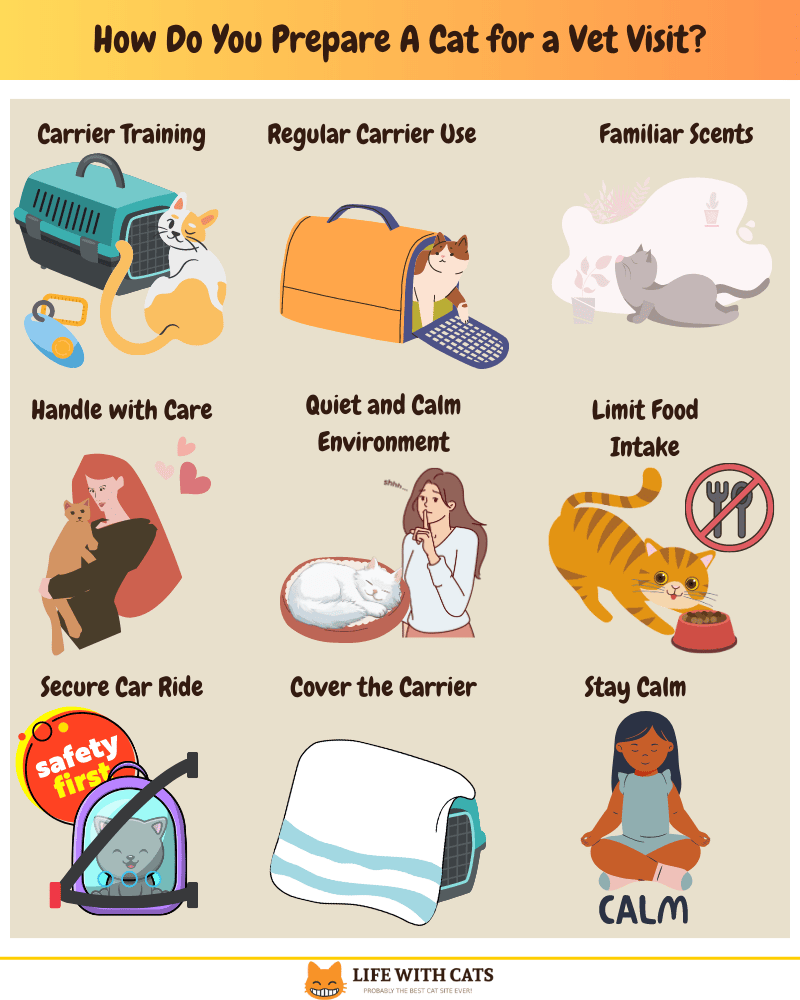
To prepare your cat for a vaccination, you can use cat vaccination training.
That’s not as difficult as it first sounds, and with patience, time, and forethought, you can ensure your feline friend is as relaxed as possible and vaccination day is as stress-free as possible.
Here are our top tips on how to prepare your cat for her vaccinations and health check.
Schedule An Appointment
First of all, you need to schedule an appointment for your cat at your vet clinic. These days, most vet clinics will text you a reminder a few weeks before your cat’s vaccinations are due. However, I recommend marking the date in your diary so that you don’t forget, just in case the technology fails.
Update Medical Records
If your cat is to go into a cattery or to a pet sitter while you’re away on vacation, you’ll need up-to-date vaccination records. Keep your cat’s vaccination cards in a safe place so that you can find them when your cat’s shots are due, and remember to take them with you when you attend your scheduled vet appointment.
At the appointment, your vet should update your cat’s medical records, including the vaccination card.
Get Your Cat Used To The Carrier
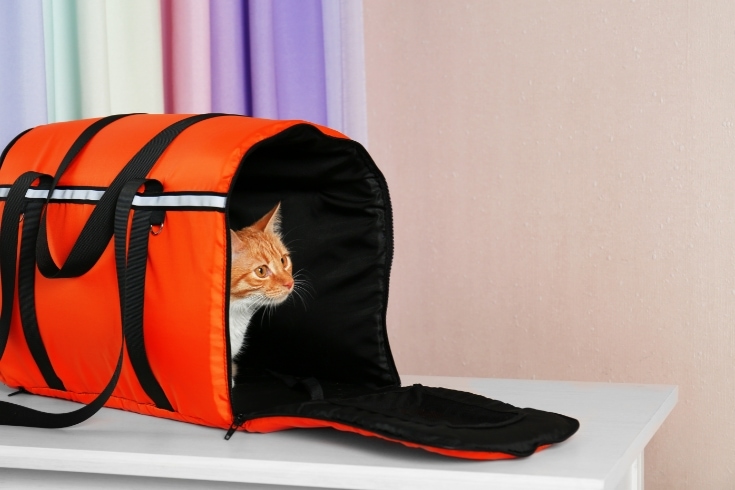
It’s true that most cats only go in a cat carrier when taken for a veterinary appointment or a boarding cattery, both of which can be pretty stressful times for your pet.
To reduce stress on the day, it’s best to familiarize your cat with her carrier at least a week before the scheduled vaccination and check- appointment. Allow your cat to sniff the carrier, and pop a few treats inside, leaving the door open so that she’s free to come and go as she pleases.
I always leave my cat carriers in the room where my cats spend most of their time for a week or so before their vet appointment so that my furry friends are used to the carriers being around before they travel.
Familiarize Your Cat With Car Rides
Before the day of the vet appointment, take your cat out for a few short rides in your car, always returning home and rewarding your cat with praise and treats. That way, your cat gets used to traveling, and the journey is not such a big shock on the day of the appointment.
Minimize Stress On Appointment Day
On the day of the vet appointment, try to have everything you need on hand well in advance.
For example, have your cat carrier ready with a comfortable bed inside it for your cat to lie on, and consider using a calming pheromone spray inside the carrier to settle your cat during her journey.
If possible, pick an appointment when you know your cat will be in the house, and if necessary, shut the outside door so that your cat can’t escape when she realizes something different is happening.
It can work quite well to exercise your cat or have a training session shortly before you are due to travel to the vet. That can help to calm your cat and burn off any excess energy.
Stay Calm
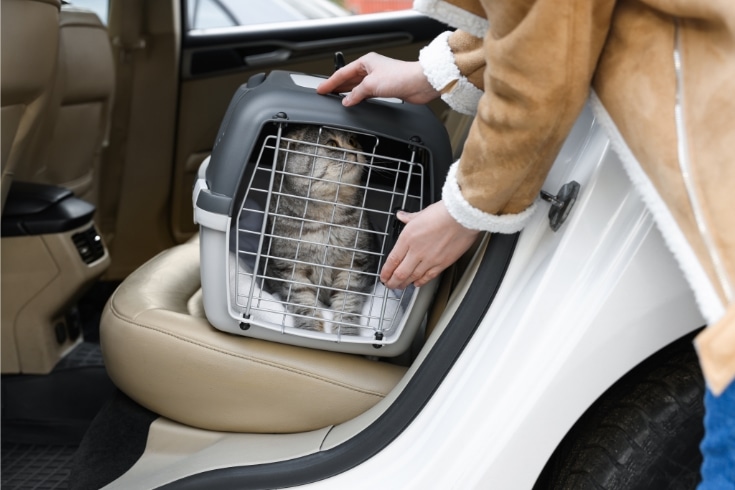
Don’t let yourself get tense and uptight before the appointment. Cats are very perceptive animals when it comes to human emotion, which is one reason they make great emotional support animals, and if you’re tense, your cat will sense it and wonder why.
Secure The Carrier
Your cat won’t enjoy the car journey if the carrier is sliding around in the back of your vehicle, so be sure to secure the carrier so that it can’t slip or tip over if you need to brake suddenly.
Comfort At The Vet’s Office
At the vet’s office, sit with your cat inside her carrier in an area away from other pets, especially dogs. Many vet surgeries have a cat-specific area in the waiting room, so take advantage of that if there is one.
Don’t be tempted to take your cat out of the carrier, as the vet clinic’s sounds, sights, and smells could frighten her.
Use Calming Techniques
While you’re waiting in the waiting area, talk calmly to your cat and reassure her. That can help to relax your pet before you take her into the consulting room for her examination and vaccinations.
Reward And Praise
Throughout the examination and vaccinations, keep chatting with your cat, use her name frequently, and stroke her. Tell your cat what a good girl she is, and reward her with praise and treats so that she associates veterinary visits with something positive and enjoyable.
How To Make Your Cat Feel Better After Vaccines?
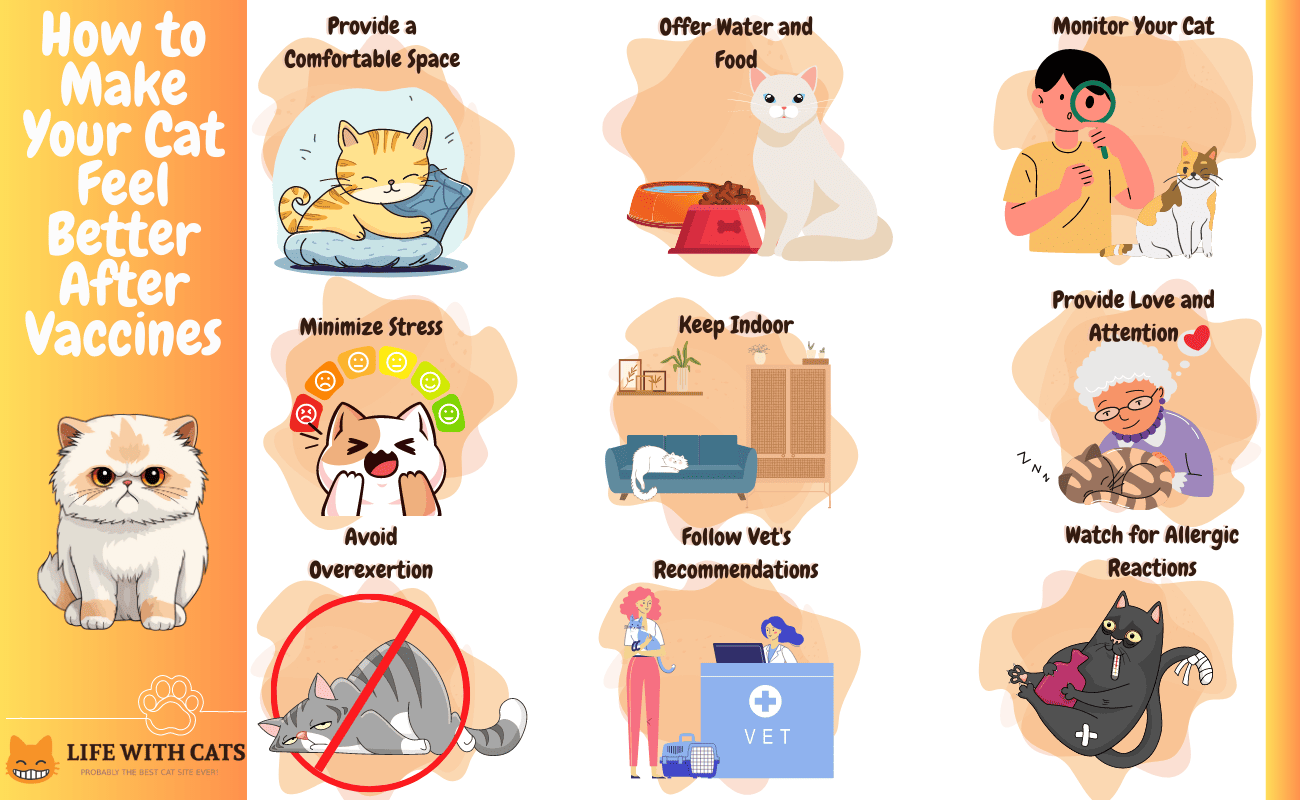
To make your cat feel better after vaccines, there are a few things you can do.
Vaccines can sometimes make your cat feel off-color, especially those that contain some disease pathogens, so you’ll need to be prepared to comfort your cat using the following tips.
Provide A Comfortable Space
Following the stress of the vet visit and the car journey, your cat will probably want to sleep and recover. So, provide your pet with somewhere warm, comfortable, and quiet, away from kids and other pets, where your pet can sleep undisturbed.
Offer Water And Food
Cats tend not to drink much, and traveling can leave them dehydrated, so always offer your cat a drink when you get home.
In addition, cats are highly perceptive to our emotions and can quickly pick up on their owner’s moods. That can mean your cat won’t eat before the car journey and vet visit simply because she’s realized something is happening. So, it’s a good idea to offer your feline friend a snack once she’s settled down again at home.
Monitor Your Cat
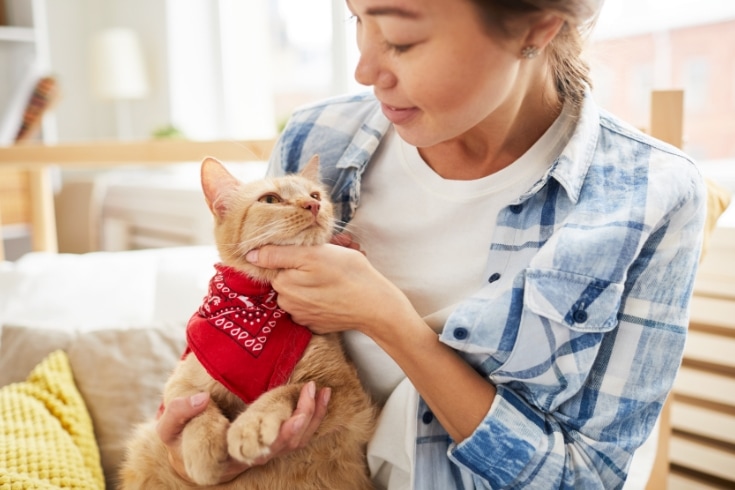
Some Vaccines can have slight side effects because they contain some of the pathogens that causes the disease. Keep an eye on your cat for a day or so after her vaccination, and if you’re at all concerned about your pet, always phone your vet and ask for advice.
Minimize Stress
The journey to the vet and the appointment itself is quite stressful for most cats, so once you get home again, try to minimize stress as much as possible. To do that, provide your cat with somewhere quiet, warm, and comfortable to rest, and offer her food and water.
Keep Indoors
If your cat is feeling slightly off-color following her vaccinations, she could be at risk when crossing a road or from the unwanted attention of other cats and even wild animals, so it can be a good idea to keep your cat indoors for the rest of the day once you get back from the vet.
Provide Love And Attention
Everyone feels better when given lots of love and attention when they’re feeling under the weather, and your cat is no different. So, perhaps rather than holding an energetic exercise or training session, changing your cat’s routine on vaccination day might be better and giving her a cuddle instead.
Avoid Overexertion
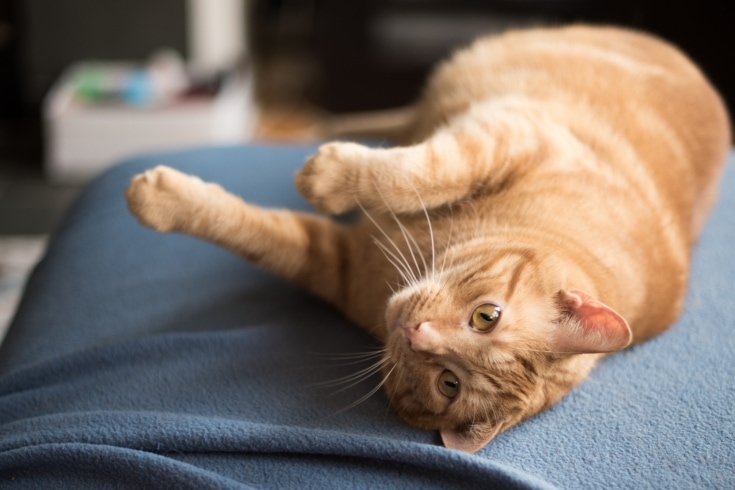
As mentioned earlier, some vaccines can leave your cat slightly off-color because they contain some disease pathogen. For that reason, I recommend not over-exerting your pet for a day or so following her vaccinations.
Follow Vet’s Recommendations
Your vet will give you advice on how to care for your cat following her vaccinations, especially if the particular shot your pet has received is likely to cause side effects. Always follow your vet’s advice; if you are unsure what to do, give them a quick phone call and ask.
Watch For Allergic Reactions
Although it’s quite unusual, some cats do suffer an allergic reaction to certain vaccines, so observe your cat carefully for the few days following her vaccinations, and if her behavior changes, ask your vet for advice.
How Do You Prevent Cat Diseases?
To prevent cat diseases, it’s imperative that you keep your pet up-to-date with all her key vaccinations and don’t allow the cover they provide to lapse. In addition, use parasite protection to keep your cat safe from fleas, ticks, and heartworms that can carry diseases that could harm your pet.
Feed your cat a high-quality, balanced diet to meet her nutritional needs and maintain a strong immune system that helps to prevent diseases. Be sure to wash your cat’s food and water dishes, clean her litter box daily, and provide your pet with a safe, comfortable space in which to rest.
Remember to wash your hands after handling other cats and pets, especially if you care for outdoor, stray, or feral cats to help prevent the spread of diseases. In a multi-cat household, isolate any new cats until you’ve had them checked over by a vet and tested for contagious diseases, and isolate any sick cats to prevent the spread of illness to your other healthy cats.
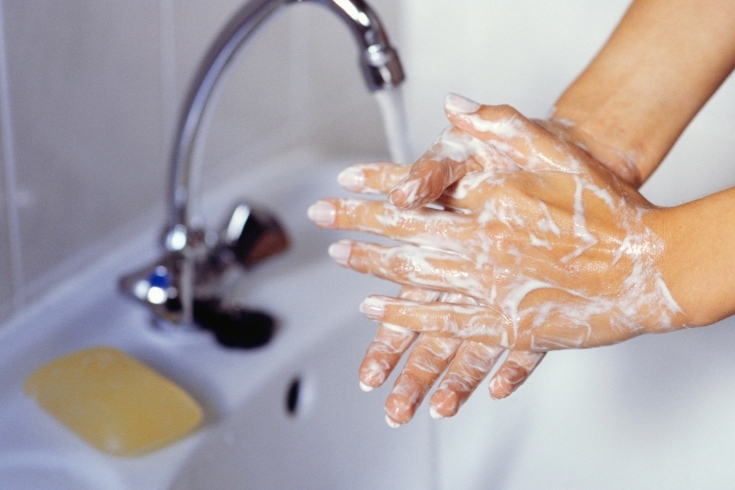
Get to know your cat’s normal behavior and appetite so that you can recognize any changes in her overall health and consult your vet promptly. Of course, taking your pet to the vet clinic for her annual cat check-up is essential to keeping your cat healthy and disease-free.
When Is The Right Time For A Cat Check-up At The Vet?
Taking your cat to the vet for an annual check-up is essential, as that can help your vet to spot any underlying health problems early. That means you can promptly start any treatment your cat needs before the condition affects her quality of life.
Annual Checkups
Your vet will carry out a routine check-up when you take your cat for her annual booster vaccinations, so you only have to make one journey and pay for one consultation.
Kitten Visits
Kittens generally need more regular veterinary check-up visits so that the vet can make sure your kitten is growing and developing correctly. Generally, monthly visits are recommended to administer booster jabs together with weight-specific parasite protection.
Sick/Miscellaneous Visits
You might also need to have your cat checked over if she’s showing signs of sickness or behavioral issues that you want your vet to take a look at. If you’re at all unhappy with your cat’s general health, don’t hesitate to have her checked over by your vet.
What Do Vets Check During A Physical Examination?
During a cat wellness exam, your vet will give your cat a thorough physical check-up to look for signs of underlying illness or developmental issues that could affect your pet’s overall health.
Vital Signs
During the first stage of a cat wellness check, the vet will check your pet’s vital signs to ensure they’re normal.
- Normal body temperature should be between 99o and 105o F (37.2 to 39.2o C)
- Respiratory rate can be an average of 20 to 30 breaths per minute
- Heart rate should be between 160 and 200 beats per minute
Eyes
Your cat’s eyes should be clear and clean with no signs of inflammation, discharge, cloudiness, and any other issues that could affect her vision or indicate underlying health problems.
Ears
Ear health is essential to prevent discomfort and ensure your cat’s overall health so that the vet will examine your cat’s ears for signs of infection, inflammation, parasites, or any abnormalities.
Nose
Your cat’s nose can provide valuable information about the animal’s respiratory health and potential infections so that the vet will inspect your cat’s nasal passages for any discharge, blockages, or abnormalities.
Mouth And Teeth
During this part of the examination, the vet checks the cat’s mouth and teeth for any dental issues, gum health, tatar buildup, and any other oral problems that might affect your cat’s ability to eat all cause her discomfort.
Skin And Coat
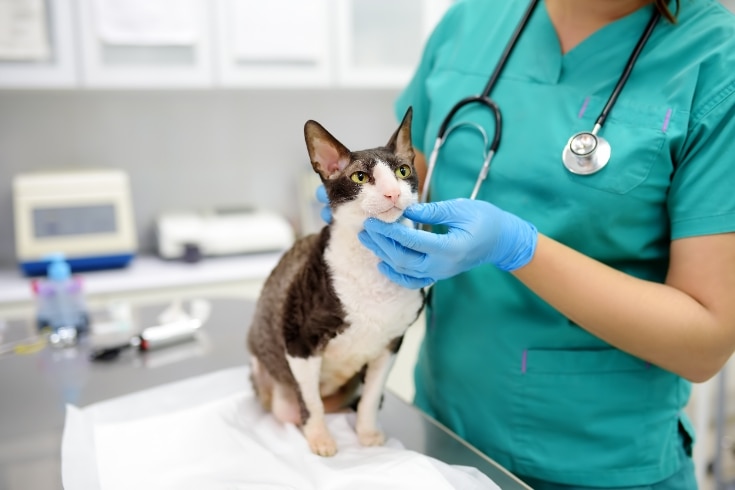
A shiny coat and healthy skin are indicators of overall wellness, so the vet assesses your cat’s coat and skin for any signs of parasites, allergies, infections, lumps, or other irregularities and abnormalities.
Abdomen
The vet examines your cat’s abdomen and palpates for signs of any abnormalities, and checks the size of the organs to identify any signs of pain or discomfort.
Heart And Lungs
Using a stethoscope, the vet listens to your cat’s heart and lungs to detect any heart murmurs, irregularities, or signs of respiratory disease.
Joints And Limbs
The vet checks your cat’s joints, limbs, and general mobility for signs of arthritis, injuries, and orthopedic issues.
Lymph Nodes
The cat’s lymph nodes are palpated to check for inflammation or swelling that could indicate underlying infection or other health problems.
Weight And Body Condition
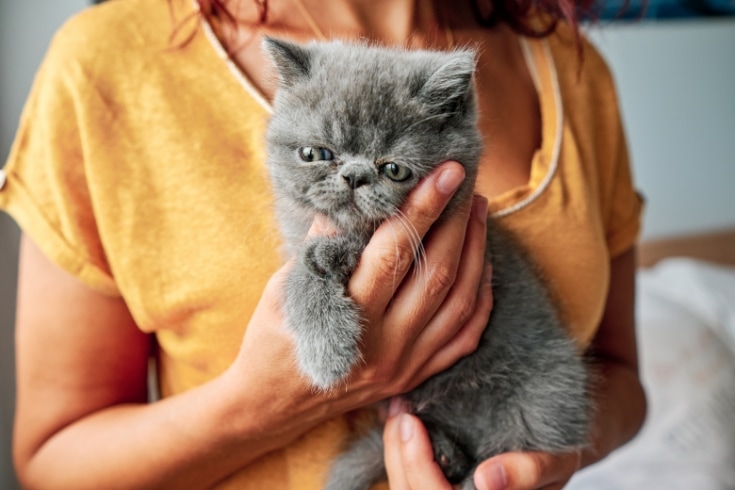
The vet will weigh your cat and evaluate her body score and muscle mass to determine whether your pet is at a healthy weight and in good physical condition.
Temperature And Hydration
The cat’s body temperature is measured to check for hypothermia or fever, and her hydration levels are also assessed since proper hydration is essential for your cat’s overall health and well-being.
Urogenital System
During this part of the examination, the vet checks your cat’s reproductive and urinary organs for any obvious abnormalities, infections, or signs of disease.
Overall Behavior And Temperament
As well as observing your cat’s general behavior, demeanor, and temperament during the examination, your vet will ask you about any behavioral changes you have noticed that could be indicative of underlying health conditions.
Vaccination And Parasite Control
Finally, the vet reviews your cat’s vaccination history to ensure that her boosters are up to date and discusses parasites control measures with you to ensure your cat is fully protected against preventable diseases and parasites.
How Do You Prepare A Cat For A Vet Visit?
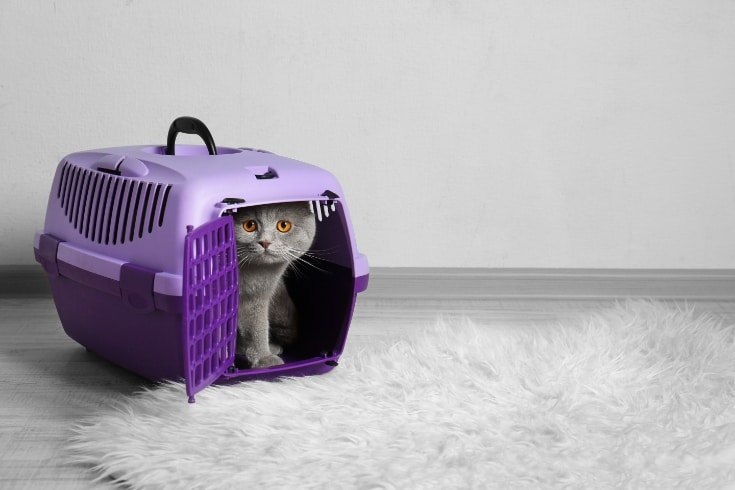
To prepare your cat for a vet visit and ensure things will go smoothly, you’ll need to take a little time to acclimate your pet to her carrier and to ride in your car. You’ll need to withhold food and drink in case of car sickness and take steps to calm your cat and relax her before the journey.
Here are some top tips on how to get your cat ready on the day of her vet visit!
Carrier Training
To prepare your cat for a vet visit, you will need to get her use to spending time in her carrier and riding in your car.
I have two carriers for my cats. I use a fabric carrier for the smaller cat since she’s lighter than her brother, while he rides in a more substantial plastic crate that gives him better stability and prevents him from sliding around during the car ride to the vet clinic.
For our expert advice on cat carrier training, check out our in-depth article at this link!
Regular Carrier Use
Rather than simply putting your cat into her carrier for the first time on the day of her vet appointment, Use your cat carrier regularly for short journeys around the block so that your cat becomes accustomed to car rides and the carrier picks up her scent.
Familiar Scents
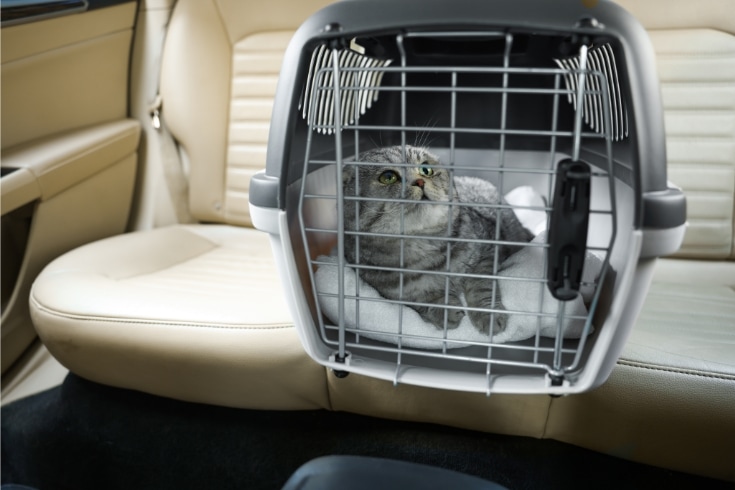
It’s a good idea to use one of your cat’s blankets in her carrier so that it smells familiar to her. If you routinely use a calming pheromone product around your home, try spraying the interior of the cat carrier with it to keep your cat relaxed during the journey.
Handle With Care
It’s usually better not to have vigorous exercise sessions for your cat on the day of her vet examination as that could leave her feeling jaded for her journey. Instead, try using puzzle toys or some simple training to exercise your cat mentally without leaving her feeling physically tired.
Quiet And Calm Environment
As always, keep your cat’s environment calm and quiet to encourage her to rest before her car ride and vet check-up. That makes it more likely your pet will arrive in a relaxed mood for her appointment and won’t get stressed and upset when she’s examined by the vet.
Limit Food Intake
Some cats get car sick, so limiting how much food and drink your cat has before you travel is advisable. Remember to offer her something to eat and drink once she’s settled again when you arrive home.
Secure Car Ride
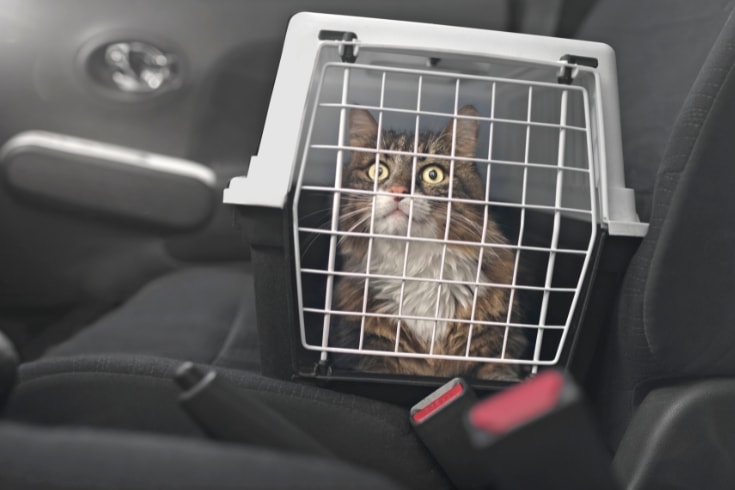
The last thing you want is for your cat to be frightened by sliding or bumping around in her carrier during the car ride to the vet clinic, so be sure to secure it on the back seat using the seat belt.
My estate car has a large tailgate area with Velcro “corner” fittings that I use to hold the carriers firmly in place while I’m driving, which works well.
Cover The Carrier
Covering the carrier creates a dark, cozy environment that most cats find comforting, so use a blanket or custom-made cover to protect your cat from the scary sights in the car and at the vet clinic waiting room.
Stay Calm
Cats are extremely perceptive to their owner’s moods, so try to keep calm and not be anxious on the day of your cat’s vet trip. You can help yourself to stay relaxed by preparing everything well in advance so you’re not rushing and panicking that you’re running late.
FAQs
In this part of our guide, we answer some of the questions most frequently asked by cat owners about cat vaccinations and health check-ups.
What Is The Difference Between Vaccination, Immunization and Inoculation?
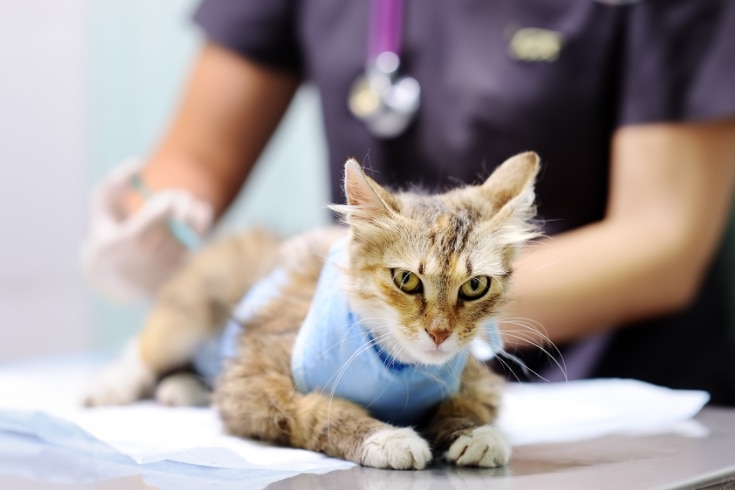
Vaccination involves administering a vaccine that stimulates the cat’s immune system to provide protection against a particular disease.
Vaccines generally contain weakened or dead pathogens or components of those pathogens that trigger an immune response in the body without actually causing the disease. Through that, the body’s immune system learns to recognize and fight those pathogens, providing the cat immunity.
Immunization refers to the overall process of developing immunity against a specific disease and includes both natural immunity acquired after being exposed to the disease and the artificial immunity that your cat gets through vaccination.
Inoculation is a rather outdated term that was once used interchangeably with vaccination to refer to the introduction of a small amount of infectious material into the cat to produce immunity to a specific disease. However, the term “vaccination” is used more commonly and is the preferred medical terminology to describe the administration of vaccines.
At What Age Do You Stop Vaccinating Your Cat?
Generally, vets recommend that a cat receives the protection of vaccines throughout its life. Kittens receive an initial course of shots, and the cat then needs annual booster vaccines to maintain protection.
However, if you’re unsure whether to stop vaccinating your cat, always consult your vet for advice and guidance.
Can I Skip My Pet’s Vaccinations If They Rarely Go Outside Or Interact With Other Animals?
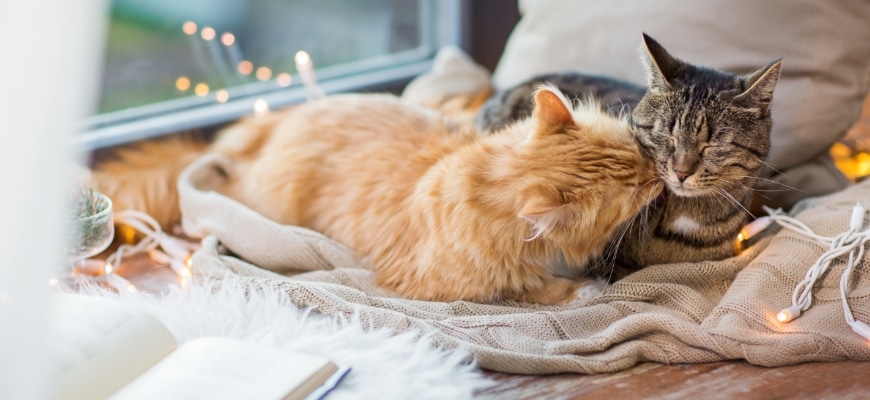
Although indoor cats do have a lower risk of catching diseases, you should still have your pet vaccinated. Some diseases are indirectly transmissible and can even be carried into your home by other pets, humans, or on surfaces.
I recommend you discuss your indoor cat’s vaccinations with your vet, who will advise you which are necessary based on your cat’s individual routine.
Why Are Regular Health Check-Ups Necessary For My Pet?
Although it might feel like an unnecessary expense at the time, taking your cat for regular veterinary check-ups allows your vet to keep an eye on your cat’s overall health and catch any potential problems early.
That means you can start managing and treating any underlying health conditions, such as tooth decay and gingivitis, that are diagnosed before they become a significant problem.
How Can I Reduce My Cat’s Stress During The Vet Visit?
Many cats, including mine, find vet visits quite stressful, but here are a few things you can do to reduce your feline friend’s anxiety:
- Use a comfortable, correctly-sized cat carrier.
- Familiarize your cat with the carrier and car gradually.
- Use pheromone calming sprays or wipes inside the carrier and your car.
- Use a cover for the cat carrier.
- Provide your cat with verbal reassurance throughout the journey.
- Remain calm!
When you arrive at the vet clinic, sit in the designated cat area of the waiting room if there is one, or wait until the last minute before bringing your cat into the waiting area, especially if there are lots of dogs and other animals there already.
How Can I Make The Car Ride To The Vet Less Stressful For My Cat?
You can make the car ride to the vet less stressful for your cat by following the tips mentioned above and ensuring that your cat carrier is securely fixed in the car to keep bumps to a minimum and prevent it from sliding around.
In addition, keep the environment inside your car comfortable, quiet, and not too warm.
Can I Calm My Cat Using Over-The-Counter Medications Before The Visit?
Although using pheromone sprays, wipes, and plugins, can help to keep your cat calm, over-the-counter medications can have side effects or prevent other treatments your cat is receiving from working properly. So, we recommend consulting your vet before giving your cat any other form of medication.
Are Cats Afraid Of Needles?
Although some cats barely seem to notice needles, others can be very reactive and sensitive. However, keeping calm and handling your cat properly can help to reduce her fear and stress, so try using treats and perhaps a toy for distraction when you take your pet for her annual shots.
Conclusion
Keeping up-to-date with your cat’s annual vaccination boosters is critical to protect your cat from the danger of several potentially fatal cat diseases. When you attend your cat’s annual shots, the vet will carry out a full health check-up that helps to spot any underlying health conditions that could affect your pet, enabling you to start treatment if necessary.
You can prepare your cat for her vet clinic visit by acclimating her to her carrier well in advance and taking your pet for a few short car journeys, returning home to praise, treats, and cuddles. That way, your cat learns that the carrier is not a scary place to spend her time and associates a car ride with rewards and positivity.
Don’t neglect your cat’s health! Although vaccinations might seem expensive and unnecessary if you have a cat that lives indoors or doesn’t go outside much, even housecats are vulnerable to dangerous pathogens that can be carried into your home on your shoes or on other animals. So, if your beloved pussycat isn’t already vaccinated, please book a vet appointment today!